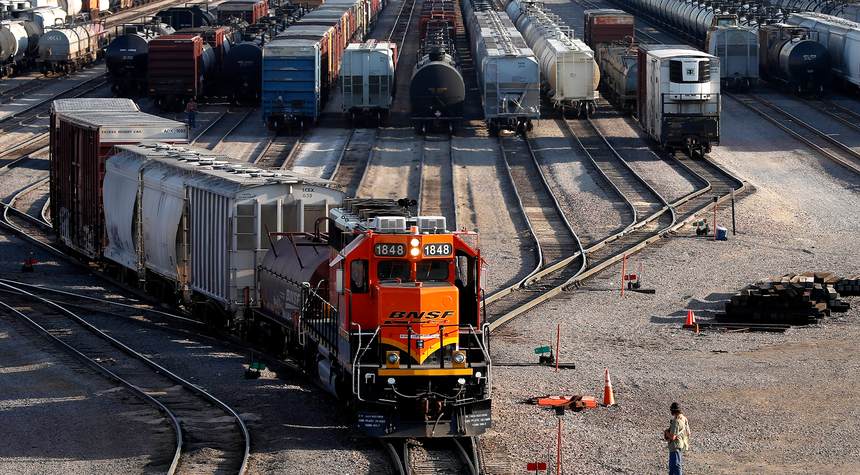This Right Here Is Exactly Why 'ESG' and 'Sustainability' Are Absolute Nonsense
You’ve probably heard a lot about Environmental, Social, and Governance (ESG) standards and how a lot of Republican states are dropping investment firms that comply with them. ESG is a “set of standards for a company’s behavior used by socially conscious investors to screen potential investments,” according to Investopedia. Those standards are, in turn, used to rule which publicly-traded companies follow progressive guidelines on environmentalism, social justice, etc.
There are a lot of companies that make the list, but plenty of them are omitted because the woke crowd is attempting to hurt them with these new standards. It is weaponized woke-ism in the private sector.
It’s also incredibly foolish. For example, Tesla was dropped by the S&P 500, despite the fact that it makes electric cars, something the entire environmentalist left pushes for us all to own. But, Elon Musk isn’t a woke progressive, so he violates some other ESG standards.
Then, there’s this: A Canadian railroad company that services oil fields in Canada is somehow an ESG-compliant company.
The Dow Jones Sustainability North America Index (DSJI) named CSX (NASDAQ: CSX), Canadian Pacific (NYSE: CP) and CN (NYSE: CNI) to its annual list of companies to achieve high scores on S&P Global’s Corporate Sustainability Assessment (CSA).
More than 10,000 publicly traded companies are invited to participate in the assessment, which evaluates how companies address sustainability through economic performance, environmental stewardship, social responsibility and corporate governance.
The North American index represents 20% of the largest 600 North American companies in the S&P Global Broad Market Index, according to CN.
[…]
CP also said it made both global and North American sustainability indices this year. This is the first year the company made the world index and the third consecutive year for the North American index.
“At CP, we continuously challenge ourselves to innovate across our business and develop meaningful ways to serve our customers, each other and the communities we operate in and through,” CP President and CEO Keith Creel said. “We are proud to be recognized again as a sustainability leader by the DJSI and [remain] committed to delivering on our sustainability journey.”
That’s all well and good. Serve the people. That’s a great company goal. And, rail does have a significantly lower carbon footprint than other forms of travel. That’s one of the reasons why progressives are so eager to push for high-speed rail in the U.S.
I have nothing against Canadian Pacific, nor do I fault them for the business they do, but… they are a major transporter of oil in Canada.
With access to ports and transload facilities across North America and direct service with short line railroads in the Alberta Industrial Heartland, CP delivers you right into the energy transportation hub of Alberta.
If you need to move synthetic crude and other refined products from Alberta to your end markets, trust us to provide efficient transportation. As the only railway serving the Nisku Business Complex, with a set of daily service options into and out of Nisku and transload facilities in South Edmonton and Fort Saskatchewan, we’re your ticket to the oil sands production areas and the Alberta Industrial Heartland.
We offer:
- Daily intermodal services in and out of Edmonton
- Daily service to the truck-to-rail transload facilities in the Edmonton area for metals, dry bulk and liquids
- Truck-to-rail transloading of dilbit at Lambton Park
- Service into the new Strathcona Logistics Centre to handle construction materials such as rebar, plate, beams, coil, piling, dry bulk products, liquids and dimensional cargo
- Service along the pipeline injection/terminating points at Hardisty and Edmonton / Fort Saskatchewan
- Transportation solutions for products that aren’t compatible with traditional pipelines, such as petroleum coke, sulphur, asphaltine and various hydrocarbon liquids and gasses
So while some American companies aren’t listed because they aren’t 100 percent compliant with ESG standards, Canadian Pacific is listed despite the fact that it transports oil across Canada.
I really don’t understand how that makes sense, and it’s clear that several politicians in red states seem to agree. They have been fighting for a long time now to drop major investment firms that use ESG standards when they decide how to invest those states’ different monies. BlackRock, the world’s largest firm, lost several states as clients over those standards – Louisiana, Florida, North Carolina, and Arizona among them – and you could see that number continue to grow. It’s a mere drop in the bucket for BlackRock, which controls trillions in assets, but it’s still an important point that those states are making.
But those “sustainability” lists of sufficiently woke corporations are based on a clearly nonsensical slate of standards if companies that do major business in transporting fossil fuels still somehow make the list.





Post a Comment